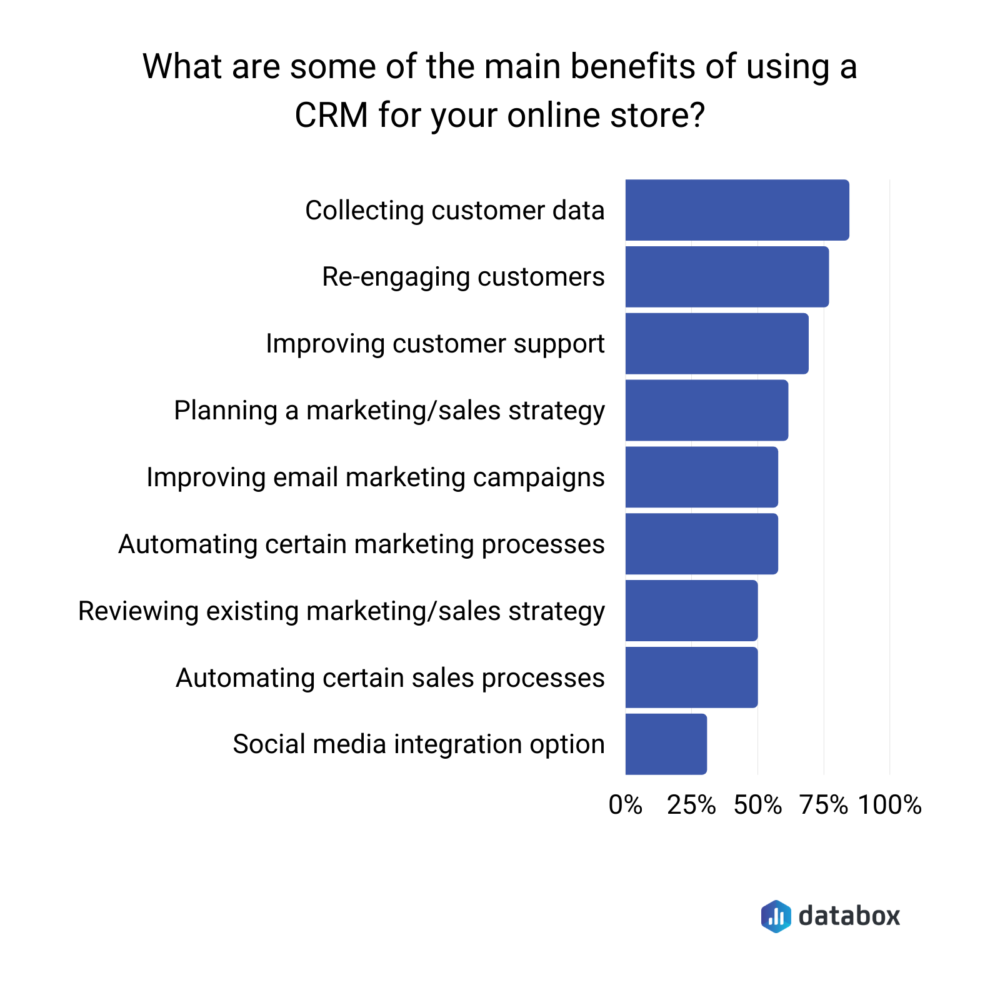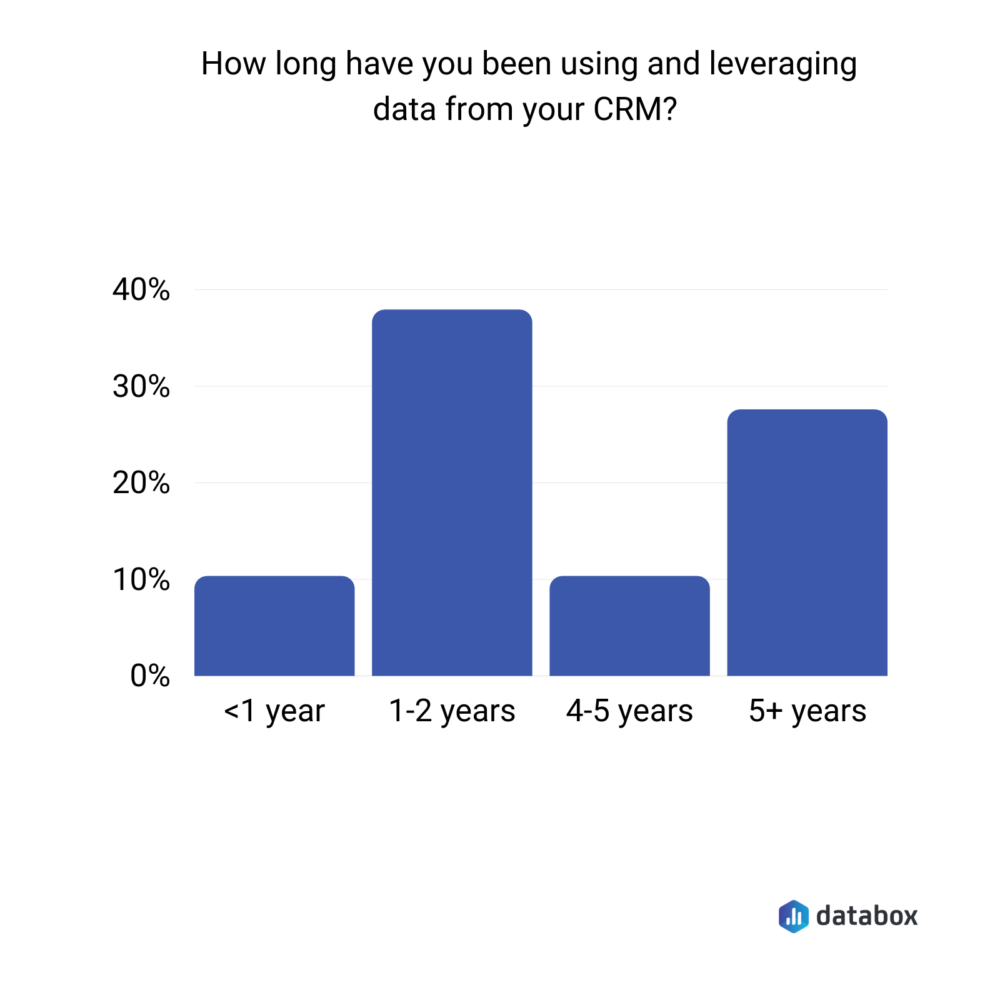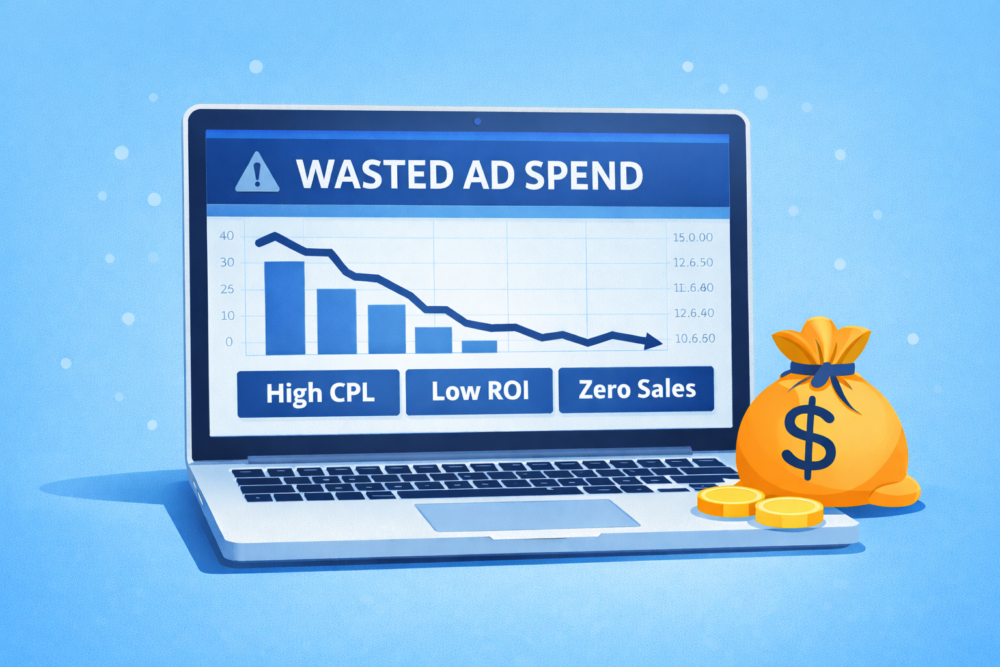Table of contents
Once your business reaches a certain size, it’s impossible to keep track of customer relationships without a good CRM tool.
But finding the best customer relationship management software for your business is not easy too, and definitely takes some trial and error.
To help you choose the best CRM for your online store, we asked 25+ ecommerce experts about the CRM software they use and recommend.
As a result, we have sourced a list of the top industry-leading CRM for ecommerce.
Altogether, you’ll learn the following today:
How to Choose a CRM for Your Ecommerce Business?
A CRM tool helps improve customer relationships by tracking your interactions with prospects and customers – saving their activity on your site, interactions and order history, storing their interests, and more.
Thanks to this functionality, the tool helps businesses accomplish a lot, for instance, improving customer support.
In fact, we asked our respondents about the benefits of their CRM software to learn how they were using the tool. And, we’ve some interesting findings to share.
About 80% said the main benefit of CRM is collecting customer data. A close majority, 75%, shared their main benefit was re-engaging customers.
55% of respondents also use it to improve customer support and around 53% use it for planning their marketing/sales strategy.
Others shared that their CRM helps them improve their email marketing campaigns, automate some marketing processes, review existing marketing/sales strategies, and automate some sales processes.
Lastly, around 30% also drive benefit from the CRMs’ social media integration option.

38% of these folks have been using the data from their CRM for 1-2 years with some 28% having used it for over 5 years.

So, how can you select a CRM for your business that helps you achieve all these benefits? Look for the following features:
- It’s intuitive and easy to use.
- Provides you a variety of automations and integrations so you can streamline and automate your workflow.
- Comes with good customer service so the team can help you set up and smoothly use the tool.
- Offers a mobile app so you can use it on the go.
If you’re a team, you’ll also want the software to provide team collaboration.
Related: The 17 Best eCommerce Tools for Growing Your Online Store
8 Best CRMs for Ecommerce
Now, for the software that the experts recommend:
PRO TIP: Visualize Your Sales Funnel and Take Control
Understanding your sales funnel can help you identify where sales prospecting, lead management, and sales processes might need some improvement. . Now you can take control and optimize your sales funnel, but first, you need to monitor the right KPIs:
- Paid Signups Per Day. How many website visitors have signed up in response to your sales and marketing efforts?
- Conversion Rate Through Funnel. See how effective your sales funnel is over time, and how efficient is your sales process at converting visitors to leads and leads to customers?
- Top of Funnel Additions. See how many qualified leads and opportunities you get from top-of-funnel marketing efforts.
- Top Closers this Month. Determine which team members are hitting their monthly sales targets and closing the most deals.
Now you can benefit from the experience of our HubSpot CRM experts, who have put together a plug-and-play Databox template showing some of the most important metrics for monitoring and growing your sales funnel. It’s simple to implement and start using as a standalone dashboard or in sales reports, and best of all, it’s free!
You can easily set it up in just a few clicks – no coding required.
To set up the dashboard, follow these 3 simple steps:
Step 1: Get the template
Step 2: Connect your HubSpot account with Databox.
Step 3: Watch your dashboard populate in seconds.
1. Active Campaign
To start, Adroit Insights’ Kristen McGarr makes the case for the CRM by suggesting that “WooCommerce and Square are all built-in ecommerce integrations with ActiveCampaign.” This makes it easy for ecommerce businesses to use the CRM alongside the tools they already use.
“ActiveCampaign’s robust automation capabilities and fully customizable fields make it easy to build your CRM to fit your business requirements,” adds McGarr.
“With the built-in email marketing, forms and social media integrations, e-commerce businesses can easily stay in front of their customers all in one platform.”
2. Copper
Charlotte Spence from Mattress Nerd thinks Copper is the best CRM for ecommerce businesses – whether small or medium-sized.
The reason? The boatload of integrations that the software offers.
“You can use Copper with Gmail, Slack, Mailchimp, and plenty of other commonly used business tools, along with chat integrations, quotes, territory management, and more,” Spence notes.
What’s more, Spence commends their customer service. Admittedly, ecommerce businesses – as any other business – may need assistance with setting up and using a CRM software. To this end, an active and helpful customer service team is a must.
3. HubSpot
Ramsha Rehan from Wikijob.uk prefers HubSpot CRM and the tools particular feature for sending personalized email campaigns. To this end, “HubSpot allows you to create custom forms for your website and send your contacts in bulk using personalized email marketing campaigns,” explains Rehan.
What’s more, Rehan appreciates the built-in reporting dashboard that “includes reports on tickets, makes data easy to track including tickets closed reports and time to close reports. HubSpot also facilitates internal communication by allowing you to assist your sales staff with transactions and tasks, corporate analytics, and meeting schedule.”
Thanks to its diverse features, Diamondback Tool Co’s Elina Manevich shares their team switched from using Mailchimp to HubSpot.
Manevich explains, “The biggest reasons we switched were:
- The capabilities to segment our customer and prospect base
- Being able to target them with different messaging.
- Having visibility into every touchpoint the customer has had with our brand online”
In short, HubSpot is a great pick for managing and tracking “all of your business relationship touchpoints including your sales pipeline, customer support tickets and responses, live chat and chatbots, contact website activity, and new prospects visiting your site,” in Rehan’s words.
4. Keap
Formerly Infusionsoft, Keap is another recommended name on this list of best CRM for ecommerce.
Matt Weidle from Buyer’s Guide lists out the tool’s winning features: “Some of the primary features of Keap’s CRM tool include that it will include built-in keyword and meta-data fields, as well as an invoice generator, among others. Mobile-friendly with task management and customer segmentation, as well as a Reminder system, calendar, and quote generator, all of which are accessible on the go.”
Put simply, you get a lot of essential features with the CRM. More importantly, you can use it on the go with its mobile app.
5. Pipedrive
Another name on this list is Pipedrive’s that Explainerd’s Natasha Rei calls “the best of its class.”
Pipedrive gets all this love because of its ease of use. “Sometimes CRM tool looks intimidating for an ecommerce business that just starts out,” Rei admits. “The tool looks complex that business owners can’t really utilize it. The great thing about Pipedrive is that the tool is simple and easy to navigate, even for new ecommerce owners.”
“Also, Pipedrive allows you to receive up-to-date analytics and the capability to manage each product on your ecommerce catalog,” adds Rei.
6. Salesforce
Another popular name among our contributors is that of the Salesforce CRM.
Maxburst’s Andrew Ruditser speaks in its favor. “We find Salesforce to be the best CRM to use for many reasons. Salesforce has a B2B marketing automated system. This includes streamlining lead management, smarter leads, lead scoring, and campaign insights.
If you have little to no experience, salesforce is very beneficial as it helps low-tech users create their own landing pages and email campaigns easily.
You can also integrate Salesforce with Google Cloud, Quickbooks, Slack, Mailchimp, Linkedin, DocuSign, Dropbox, and many more.”
With that, Ruditser also admits to the pricey cost of the Salesforce CRM. But goes on to say that the investment “is well worth the extra spend as it is known for its easy learn and use.”
Stephen Light of Nolah Mattress also spotlights the fact that you can pay according to the features you use. “The best part about Salesforce is the ability of users to add and remove certain features to their plans. With this capability, users only pay for the services they need and do not worry about spending on features that they don’t even use.”
Light outlines that tool offers incredible customer service and ease of use as well. “Since it’s the most popular CRM program in the market today, it’s not hard to find a sales representative with a few seconds of searching on the internet.
Although there is a never-ending learning curve because of the routine updates, the simplicity of the program’s user interface makes it easy for users to adapt quickly to any software changes.”
7. Sendinblue
This one’s a name put forward by Alex Birkett from Conversion.AI for the comprehensive toolkit the software offers.
“They’re obviously not only a CRM – really, they’re known for their email marketing and messaging suite. But their CRM is quite simple to use, it integrates with Shopify and most other ecommerce platforms, and I really love the native integration with the rest of their marketing tools (email marketing, automation, chat, SMS, ads, forms, etc.).”
In terms of pricing, Birkett adds, “they’re also well-priced for companies of all sizing (pricing scales well, unlike other ostensibly cheap or freemium CRMs that get very expensive after a certain threshold).”
8. Zendesk Sell
Last on this list is Zendesk Sell.
Blogrolling’s Sebastian Schaeffer notes, “I like Zendesk Sell because it has great controls for DC contacts which allow us to communicate better with our customers.
One particularly great feature for ecommerce is its message template creation tool which stores auto-complete information, making it much easier for people to use your store and complete the checkout process.”
In short, “a good CRM should allow you to automate the tedious work easily, which is exactly what Zendesk Sell does,” Schaeffer sums up.
With this list of best CRM for ecommerce, we hope you can find the perfect one for your business. It’s best you start with a trial for any tool that you think meets your needs before going on to pay for it. This will give you a feel of the CRM and an idea of how to use it and whether it can help you.















